Filter by

Between Violence, Vulnerability, Resilience and Resistance: Arab Television N…
How are the structures of power and the notion of agency among Syrian women during the recent Syrian conflict connected? To explore this matter, Rand El Zein investigates gender politics around displacement, conflict, the body, and the nation. In doing so, she outstandingly reconciles critical media theory as myriad and productive with the theoretical concepts on subjectivity, power, performati…
- Edition
- -
- ISBN/ISSN
- 9783839459591
- Collation
- -
- Series Title
- -
- Call Number
- 300 ZEI b

Hybrid Museum Experiences Theory and Design
"So you’re the one getting this gift? Lucky you! Someone who knows you has visited the museum. They searched out things they thought you would care about, and they took photos and left messages for you." This is the welcoming message for the Gift app, designed to create a very personal museum visit. Hybrid Museum Experiences use new technologies to augment, expand or alter the physical experi…
- Edition
- -
- ISBN/ISSN
- 9789048552849
- Collation
- -
- Series Title
- -
- Call Number
- -

Game Production Studies
Video games have entered the cultural mainstream and in terms of economic profits they now rival established entertainment industries such as film or television. As careers in video game development become more common, so do the stories about precarious working conditions and structural inequalities within the industry. Yet, scholars have largely overlooked video game production cultures in fav…
- Edition
- -
- ISBN/ISSN
- 9789048551736
- Collation
- -
- Series Title
- -
- Call Number
- -
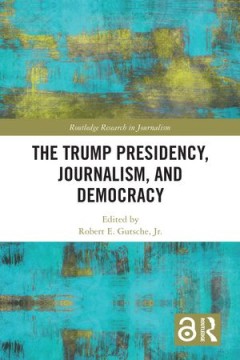
The Trump Presidency, Journalism, and Democracy
This book examines the disruptive nature of Trump news – both the news his administration makes and the coverage of it – related to dominant paradigms and ideologies of U.S. journalism. By relying on conceptualizations of media memory and "othering" through news coverage that enhances socio-conservative positions on issues such as immigration, the book positions this moment in a time of con…
- Edition
- -
- ISBN/ISSN
- 9781351392020
- Collation
- -
- Series Title
- -
- Call Number
- 070.449304 TRU t
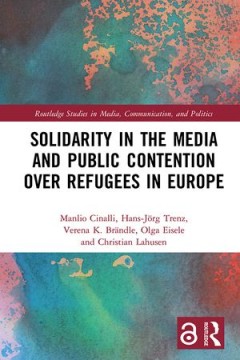
Solidarity in the Media and Public Contention over Refugees in Europe
This book examines the ‘European refugee crisis’, offering an in-depth comparative analysis of how public attitudes towards refugees and humanitarian dispositions are shaped by political news coverage. An international team of authors address the role of the media in contesting solidarity towards refugees from a variety of disciplinary perspectives. Focusing on the public sphere, t…
- Edition
- -
- ISBN/ISSN
- 9781000370485
- Collation
- -
- Series Title
- -
- Call Number
- 302.23 SOL s
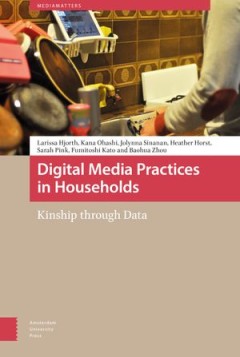
Digital Media Practices in Households Kinship through Data
How are intergenerational relationships playing out in the digital rhythms of the household? Through extensive fieldwork in Tokyo, Shanghai and Melbourne, this book ethnographically explores how households are being understood, articulated and defined by digital media practices. It explores the rise of self-tracking, quantified self and informal practices of care at distance as part of contempo…
- Edition
- -
- ISBN/ISSN
- 9789048542062
- Collation
- -
- Series Title
- -
- Call Number
- -
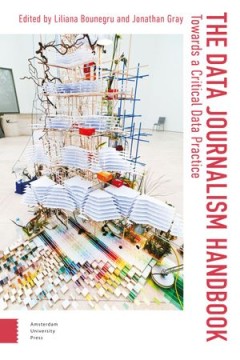
The Data Journalism Handbook Towards A Critical Data Practice
The Data Journalism Handbook: Towards a Critical Data Practice provides a rich and panoramic introduction to data journalism, combining both critical reflection and practical insight. It offers a diverse collection of perspectives on how data journalism is done around the world and the broader consequences of datafication in the news, serving as both a textbook and a sourcebook for this emergin…
- Edition
- -
- ISBN/ISSN
- 9789048542079
- Collation
- -
- Series Title
- -
- Call Number
- -
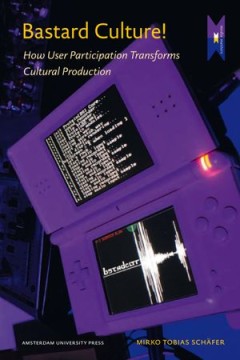
Bastard Culture! How User Participation Transforms Cultural Production
New online technologies have brought with them a great promise of freedom. The computer and particularly the Internet have been represented as enabling technologies, turning consumers into users and users into producers. Furthermore, lay people and amateurs have been enthusiastically greeted as heroes of the digital era. This thoughtful study casts a fresh light on the shaping of user participa…
- Edition
- -
- ISBN/ISSN
- 9789089642561
- Collation
- -
- Series Title
- -
- Call Number
- -
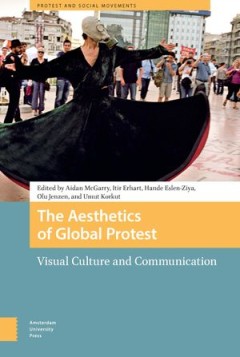
The Aesthetics of Global Protest Visual Culture and Communication
Protestors across the world use aesthetics in order to communicate their ideas and ensure their voices are heard. This book looks at protest aesthetics, which we consider to be the visual and performative elements of protest, such as images, symbols, graffiti, art, as well as the choreography of protest actions in public spaces. Through the use of social media, protestors have been able to crea…
- Edition
- -
- ISBN/ISSN
- 9789048544509
- Collation
- -
- Series Title
- -
- Call Number
- -

Right Across the World : The Global Networking of the Far-Right and the Left …
In a post-Trump world, the right is still very much in power. Significantly more than half the world’s population currently lives under some form of right-wing populist or authoritarian rule. Today’s autocrats are, at first glance, a diverse band of brothers. But religious, economic, social and environmental differences aside, there is one thing that unites them - their hatred of the libera…
- Edition
- -
- ISBN/ISSN
- 9781786808554
- Collation
- -
- Series Title
- -
- Call Number
- -
 Computer Science, Information & General Works
Computer Science, Information & General Works  Philosophy & Psychology
Philosophy & Psychology  Religion
Religion  Social Sciences
Social Sciences  Language
Language  Pure Science
Pure Science  Applied Sciences
Applied Sciences  Art & Recreation
Art & Recreation  Literature
Literature  History & Geography
History & Geography